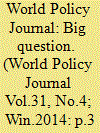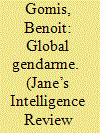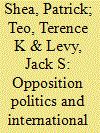|
|
|
Sort Order |
|
|
|
Items / Page
|
|
|
|
|
|
|
| Srl | Item |
| 1 |
ID:
136471


|
|
|
|
|
| Summary/Abstract |
Europe is in the throes of a crisis of identity springing from deep economic distress in many of its member states and political divisions both within and without. World Policy Journal asked a European panel of experts—from France to Bulgaria to Sweden—how this crisis is affecting their corner of the continent and what their countries need to remain viable.
|
|
|
|
|
|
|
|
|
|
|
|
|
|
|
|
| 2 |
ID:
136937


|
|
|
|
|
| Summary/Abstract |
Based on 45 interviews in the Paris metropolitan area, I focus on the middle-class segment of France’s North African second-generation and use the framework of cultural citizenship to explain why these individuals continue to experience symbolic exclusion despite their attainment of a middle-class status. Even though they are successful in terms of professional and educational accomplishments and are assimilated by traditional measures, they nonetheless feel excluded from mainstream French society. Because of this exclusion, they do not feel they are perceived as full citizens. I also discuss how this segment of France’s second-generation draws boundaries around being French and how they relate to these boundaries. Despite their citizenship and their ties to France, they are often perceived as foreigners and have their ‘Frenchness’ contested by their compatriots. I argue they are denied cultural citizenship, because of their North African ethnic origin, which would allow them to be accepted by others as part of France. Applying cultural citizenship as an analytical framework provides an understanding of the socio-cultural realities of being a minority and reveals how citizenship operates in everyday life.
|
|
|
|
|
|
|
|
|
|
|
|
|
|
|
|
| 3 |
|
| 4 |
ID:
136325


|
|
|
|
|
| Summary/Abstract |
Following notification by the French cabinet on the 18th June 2014, and eh consultation phase, the ecology minister somnolence royal presented the bill on energy transition.
|
|
|
|
|
|
|
|
|
|
|
|
|
|
|
|
| 5 |
ID:
136410


|
|
|
|
|
| Summary/Abstract |
The Iranian nuclear issue has long vexed Tehran’s political and economic relations with the international community. The talks between Iran and the P5+1 (China, France, Germany, Russia, the United Kingdom, and the United States) on Tehran’s nuclear program entered a transformative phase after Iranian President Hassan Rouhani, with the backing of Supreme Leader Ayatollah Ali Khamenei, appointed a new team to lead the Iranian delegation
|
|
|
|
|
|
|
|
|
|
|
|
|
|
|
|
| 6 |
ID:
136098


|
|
|
|
|
| Summary/Abstract |
EU citizenship is often regarded as the culmination of a process whereby the transnational mobility of “workers” has led to the granting of rights to “humans” qua citizens, with both legal scholars and ethnographers emphasizing its normative significance in this respect. Challenging such a narrative, this study sets out to highlight the contingent nature of a postnational EU citizenship, with reference to the lived experiences of migrant Roma. As a first step, we highlight the conditionality within EU law associated with the granting of rights to those enacting EU citizenship by residing within EU territory beyond their own member state. In a second step, we highlight the variable ways in which such conditionality is deployed in different national contexts, with reference to the frameworks in France and Spain. While the former has deployed these conditions in a manner that has excluded EU citizens, particularly migrant Roma, the latter—at least for a time—was more permissive in its granting of rights to EU citizens than EU law required. However, in a third step, we suggest that the lived experiences of migrant Roma in these two national contexts have not been as different as the legal differences suggest. Drawing on ethnographic fieldwork on Romanian Roma in two municipalities near Barcelona, we demonstrate the ways in which a local politics of exclusion is legally possible, even within an ostensibly permissive juridical framework of citizenship. We highlight how the ambiguity of a multilevel citizenship not only opens up possibilities for multifaceted forms of exclusion, but also for various forms of resistance, both within and beyond a juridical citizenship framework.
|
|
|
|
|
|
|
|
|
|
|
|
|
|
|
|
| 7 |
ID:
134655


|
|
|
|
|
| Summary/Abstract |
“French nuclear diplomacy” is the French government's use of civilian nuclear cooperation agreements (NCAs) to advance specific commercial and strategic interests. During the heart of the so-called nuclear renaissance, the Élysée Palace aggressively peddled France's nuclear expertise and technology abroad, signing over a dozen new NCAs in an effort to bring in business for the French industry, forge diplomatic relationships, and promote global nonproliferation norms. Several years later, however, the outcomes of France's aggressive global nuclear power push appear nominal at best. This article explores the mixed results of this nuclear campaign, and through three case studies, illustrates how many of France's commercial and political disappointments stem from unrealistic expectations and the disorganization of the French nuclear complex.
|
|
|
|
|
|
|
|
|
|
|
|
|
|
|
|
| 8 |
ID:
135692


|
|
|
|
|
| Summary/Abstract |
Francois Hollande has proved active on the international stage, intervening militarily and diplomatically on many fronts, Benoit Gomis examines whether persistent internal challenges may force France to become more isolationist in the future.
|
|
|
|
|
|
|
|
|
|
|
|
|
|
|
|
| 9 |
ID:
136609


|
|
|
|
|
| Summary/Abstract |
Democratic foreign policy choices are a function of expected international outcomes and the preferences, power, and information of domestic actors. Studies of domestic political competition and international crisis bargaining have argued that an opposition's policy positions send credible signals of the government's intentions to adversarial target states. This paper contends that while opposition behavior may send informative signals, it can also directly constrain the policy options of the government. We relax previous assumptions that the opposition cannot directly prevent war or influence the outcomes of war (Schultz 2001). Instead, we assume that the opposition controls some political resources and attempts to influence the government's policy decisions in a way that advances its own partisan interests. To empirically demonstrate the theoretical differences in our model in comparison with previous domestic opposition models, we examine the case of the Quasi-War of 1798 between the United States and France.
|
|
|
|
|
|
|
|
|
|
|
|
|
|
|
|
| 10 |
ID:
136730


|
|
|
|
|
| Summary/Abstract |
The article studies the range of problems that have emerged due to the growing immigration from Muslim countries into the European Union (EU). While describing the functions of immigrants' communities, the authors focus on their political role in the receiving states. The study of the historical development of government–diaspora relations in three cases (the UK, France, and Germany) shows that Muslim communities' political influence does not reflect their economic and cultural role, which in the future might threaten the EU security, unless these countries develop a new approach to an “acculturation” policy.
|
|
|
|
|
|
|
|
|
|
|
|
|
|
|
|
| 11 |
ID:
134257


|
|
|
|
|
| Summary/Abstract |
Using discursive institutionalism as an analytical framework, this article addresses how national actors build, coordinate and communicate discourses on EU defence policy (CSDP) at home. The empirical analysis is based on a comparative study of substantive and interactive discourses in France and Ireland, two contrasted cases. It demonstrates that France and Ireland frame and interpret elements of CSDP that best fit their needs, use them to promote their defence agenda in a legitimate and ‘European’ way and present CSDP as a natural continuation of their preferences. These defence agendas revolve around the preservation of France’s exceptionalism and Ireland’s neutrality. Discursive institutionalism, which methodologically sheds light on agents and institutional contexts, helps to understand the dynamics of constructive ambiguity, a discursive strategy often applied to CSDP and illustrated by these two cases.
|
|
|
|
|
|
|
|
|
|
|
|
|
|
|
|
| 12 |
ID:
134970


|
|
|
|
|
| Summary/Abstract |
This article looks at the changing nature of European militaries specifically within the context of the United States’s transformation agenda. The article looks at the key drivers of transformation in European militaries and asks the question to what degree has the American agenda impacted on the way Europe does defence. The article looks at three aspects of transformation across three case studies. The aspects are network enabledness, expeditionary forces and effects based operations. The analysis is applied to the United Kingdom, France and Germany. The findings suggest that local political and bureaucratic conditions have the potential to trump a larger process of force transformation led by the United States.
|
|
|
|
|
|
|
|
|
|
|
|
|
|
|
|
|
|
|
|
|